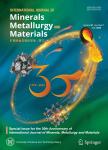Towards a sustainable technology for production of extra-pure Ti metal:Electrolysis of sulfurized Ti(C,N)in molten CaCl_(2)
Towards a sustainable technology for production of extra-pure Ti metal:Electrolysis of sulfurized Ti(C,N) in molten CaCl作者机构:Division of Materials Science and EngineeringFaculty of EngineeringHokkaido UniversitySapporo 060-8628Japan Japan Society for the Promotion of Science(JSPS)Tokyo 102-0083Japan
出 版 物:《International Journal of Minerals,Metallurgy and Materials》 (矿物冶金与材料学报(英文版))
年 卷 期:2020年第27卷第12期
页 面:1635-1643页
核心收录:
学科分类:080603[工学-有色金属冶金] 08[工学] 0806[工学-冶金工程]
基 金:The Japan Society for the Promotion of Science(JSPS)Postdoctoral Fellowship(No.P18054) Grants-in-Aid for Scientific Research(KAKENHI)(Nos.18F18054 and 17H03434) the Ministry of Education,Culture,Sports,Science and Technology(MEXT)Nanotechnology Platform Program(No.A-19-HK-0034) the Japan Mining Industry Association support from JSPS and the International affairs office of the Faculty of Engineering,Hokkaido University
主 题:titanium molten salt electrolysis sulfidation titanium oxycarbonitride ilmenite
摘 要:A new concept for producing highly pure Ti metal powder from ilmenite(FeTiO)_(3))is proposed in this *** nitride(TiN)or titanium oxycarbonitride(TiO_(x)C_(y)N_(z))could be synthesized in the first step via the simultaneous carbothermal reduction and nitridation(CTRN)of FeTiO3 to remove oxygen *** separate oxygen completely,high-quality TiS2 samples were then synthesized from TiN and TiC using S2 gas,and the clean sulfides were finally reduced toα-Ti powders with spherical morphology using electrolysis in molten CaCl_(2).Xray diffraction(XRD),scanning electron microscopy(SEM)in conjunction with energy-dispersive X-ray spectroscopy(EDS),and elemental LECO analysis were used to study the phases and microstructures of the sulfides and the electrochemically reduced *** Ti powder showed no carbon contamination and consisted of high-purity foil-like Ti sheets with very low oxygen,carbon,and nitrogen contents of less than 0.15 wt%O,0.02 wt%C,and 0.003 wt%N,*** quality of the Ti powder was much higher than that of the powder obtained using the conventional OS process(proposed by *** and ***)starting directly from the oxides.



